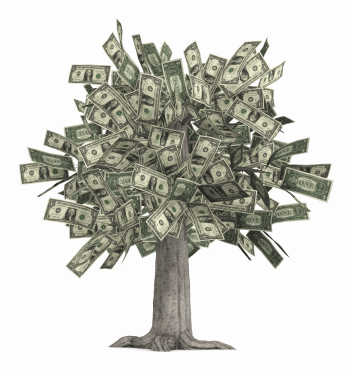
- It’s a nest egg to take care of you should you lose your job, decide to buy your first home, or decide to start your own company.
- As it grows, it will begin to spin off dividends for you in the form of compound growth and interest income.
- Eventually, like a real tree, it will get to the point where it can grow on its own without additional input from you.
- Housing
- Clothing
- Shelter
- Eating out
- Expensive vacations
- Expensive cars
Consider what you would do if your rent suddenly went up 10%, or if your car insurance went up 10%. It would mean less money to go around, right? You’d invariably have to cut back a little bit, finding more efficient ways to spend your money, looking a little harder for deals, perhaps eating a little less often at that nice restaurant.
Instead of waiting for your living expenses to increase, as they invariably do, why not do this little trick: Pay yourself first. What does this mean? It means, go to your bank, set up an automatic payment program, and have them put aside 10% of your money into a savings or investment account before you even see it in your account. You can start out with savings account, Bank CDs or GICs. Once you have a base of savings, you can then move on to ETFs and low-cost indexed mutual funds. Just like what would happen if you had a small paycut, or if life suddenly got more expensive, you will soon adjust to the new situation. Even better, you will be putting money aside and it will be growing.
How much can it grow? Let’s say you set aside $150/month to put into your savings. $150/month is less than the price of a movie date every weekend or lunch at McDonald’s every day! Add in 5% of compound growth, and that $150/month can end up to more than $10,000 after 5 years. That’s more than enough to buy a very nice gift for yourself and that special someone… or to just keep growing your tree of wealth!
A good, short read that I recently discovered and that will help you get started is The Richest Man in Babylon; the chapter summaries can be read for free on Wikipedia. The book is essentially a set of parables set in ancient Babylon, and cover the ways to gaining and keeping wealth. They were written by George Samuel Clason in order to teach people about personal finance and get them on the road to savings. I’ll be covering the chapter summaries and the basic lessons they present in future posts. Another good book to help you get started is The Wealthy Barber.
In my personal experience, I only really started to grow my own money tree a few years ago. If you haven’t yet started, then it’s never too late to start; if you already have started, then what made you head down the road of savings? Were you always a saver, or was there a time when you realized that you were fed up of being a slave to your paycheck?
Don’t forget… whether it be $50 a month or $500, something is better than nothing, so go out there and plant your seed of savings!


No comments:
Post a Comment